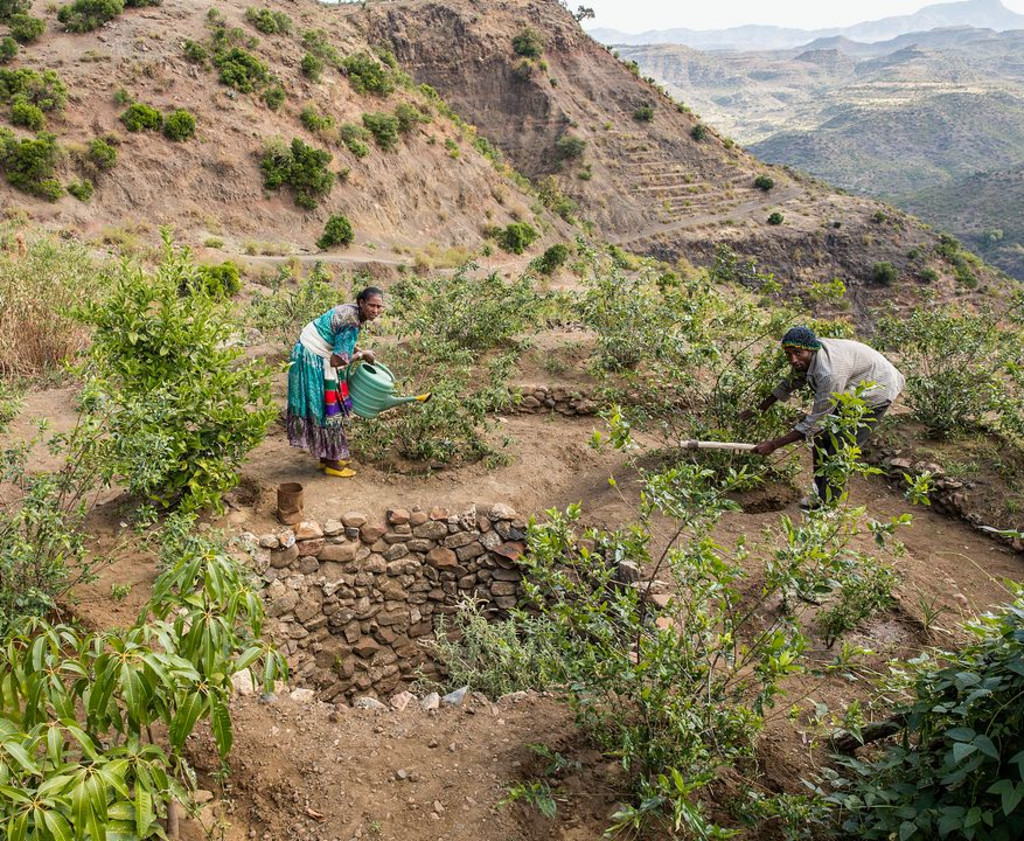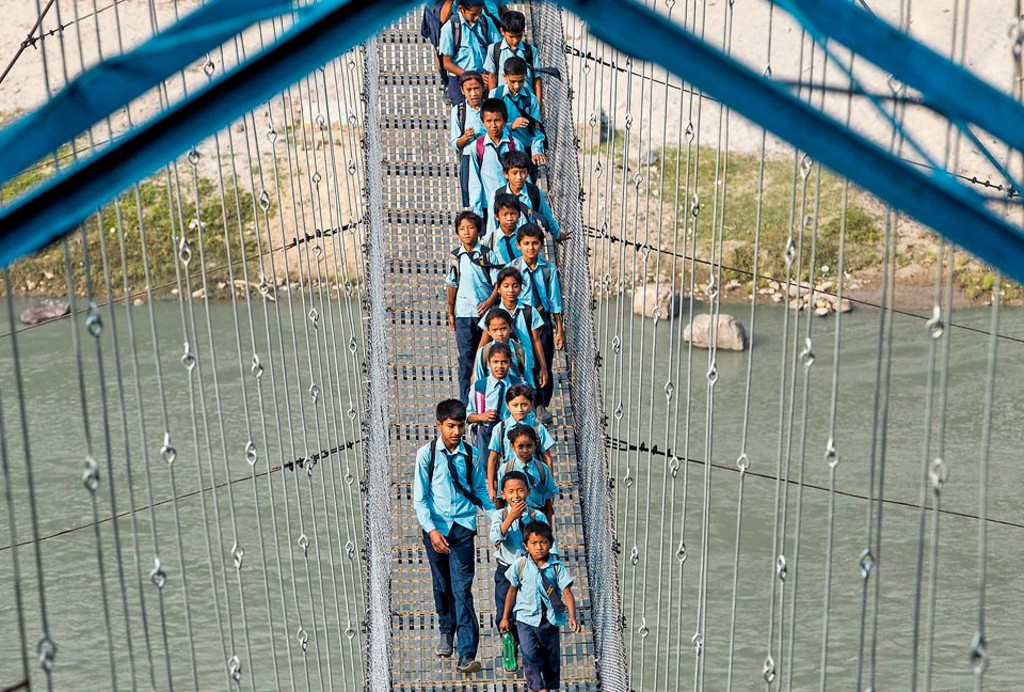Switzerland has been providing development aid for almost 60 years now. What began with the construction of hanging bridges in Nepal has developed over decades into a comprehensive policy that aims to improve the living conditions of people in developing nations. Since then, millions of people in Africa, Asia and Latin America have benefited from education and health programmes. Switzerland has also made its mark as a neutral state that promotes peace and the rule of law. To this day, the primary goal of worldwide development cooperation is to fight poverty. For the first time, this cooperation has been linked with the goal of sustainable development in the 2030 Agenda, which was adopted by the United Nations in September 2015, and has an economic, social and ecological dimension, including measures on climate protection.
Developing countries are future markets
In Switzerland, the Federal Council lays down the strategy for international cooperation every four years. It now wants to set a new course for 2021–2024. When it comes to selecting the countries and programmes, in addition to reducing poverty, the new strategy should take greater account of the interests of the Swiss economy as well as Swiss interests related to migration and security. When approached for a comment by the “Swiss Review”, Foreign Minister Ignazio Cassis (FDP) said that “Switzerland’s open and strongly globalised economy makes it reliant on a stable international order”. The Confederation has an interest in strengthening the constitutional principles in developing countries, on the one hand for the people living there, “but also because these countries are potential future markets”. Switzerland also has an interest in “tackling the underlying causes of irregular migration and flight”, Cassis said.
However, in the case of migration politics, the Federal Council will refrain from making development aid dependent on a country’s cooperation – for example in readmitting rejected asylum seekers – as the SVP continues to demand. Aid agencies as well as the Organisation for Economic Cooperation and Development (OECD) have expressed misgivings about this linkage. In spring 2019, the OECD Development Assistance Committee warned that Swiss development aid should concentrate more on the needs of its partner countries and less on combating irregular migration.
Withdrawal from Latin America
On the other hand, the OECD considers it a step in the right direction that Switzerland wants to place geographical boundaries on its commitment. The Federal Council intends to concentrate on providing bilateral aid to the poorest regions of Africa, the Middle East, Asia and eastern Europe, and to reduce the present number of 46 priority countries to 34 in the future. The withdrawal from Latin America is justified with the argument that these countries – with the exception of Haiti – are no longer among the poorest in the world. Aid agencies are less convinced, however. There is massive social inequality and conflict in Latin American countries too, such as in Bolivia, stresses Mark Herkenrath, Managing Director of Alliance Sud, the thinktank of the six largest Swiss aid agencies (Swissaid, Fastenopfer, Brot für alle, Helvetas, Caritas, Heks). Through its efforts, Switzerland is making a major contribution to strengthening civil society and protecting human rights in Latin America. “A withdrawal is only acceptable if the freed-up resources flow back into combating poverty rather than into building partnerships with the private sector,” says Herkenrath. From experience, there has been limited success in mobilising private resources in fragile states.
Controversial role of the private sector
However, Federal Councillor Cassis wants to strengthen the role of the private sector. It is “essential that it is included in development cooperation due to its innovatory strength, expert knowledge, sales channels and investment options”, he said. From the perspective of Alliance Sud, the private sector contributes to sustainable development when it creates “decent” jobs, and respects human rights and the environment in developing countries rather than using them for tax evasion.
The Federal Council is expected to decide on its definitive message on international cooperation for the period 2021–2024 in February 2020. Last summer, around 250 organisations, parties and associations took part in the first-ever consultation process carried out on the strategic key issues. There has been widespread criticism as many believe the goals are extremely vague.
80 centimes per day/inhabitant
Both the strategy and the framework credit for the next four years will be presented to parliament. A total amount of 11.37 billion Swiss francs is envisaged for international cooperation, which corresponds to around 80 centimes per day/inhabitant. The planned total sum is slightly higher than the 11.11 billion Swiss francs that is available for the current 2017–2020 period.
Switzerland will no longer spend money on development aid on the basis of gross national income (GNI). The spending is likely to make up around 0.45 per cent of the GNI. In 2011, parliament ordered the Federal Council to raise this figure to 0.5 per cent. However, this goal will not be achieved in the current period.
Last year, the OECD Development Assistance Committee repeated its call for Switzerland to keep the promise that it made in 2011. Aid agencies that have been pleading for years for a figure of 0.7 per cent of GNI now hope that the newly formed parliament will make the appropriate corrections. Alliance Sud notes that countries including Sweden, Luxembourg, Norway, Denmark and the UK have allocated up to one per cent of their yearly GNI for development cooperation.
The SVP, on the other hand, wants to make radical cuts. From its perspective, Switzerland spends too much taxpayer money on development aid. For this reason, the People’s Party wants to shift one billion francs from the development aid budget to the old-age insurance fund annually. A popular initiative to this effect is in the pipeline. The only money that the SVP wants to protect from cuts is humanitarian aid for people in dire need after catastrophes such as famines or earthquakes.
Consultation process documents on Swiss development cooperation for the years 2021 – 2024





![[Translate to en:]](/fileadmin/_processed_/d/2/csm_Revue_202204_Huehnerfarm_SH-Reportage_3074_7901ca94df.jpg)






Comments
Comments :
Fait vivre la multitudes de ONG ou se perd l' efficacite et les fonds se perdent avant d'arriver au but.
Ce changement de strategie les bousculent. Bien un changement et bouscule les mauvaises habitudes.